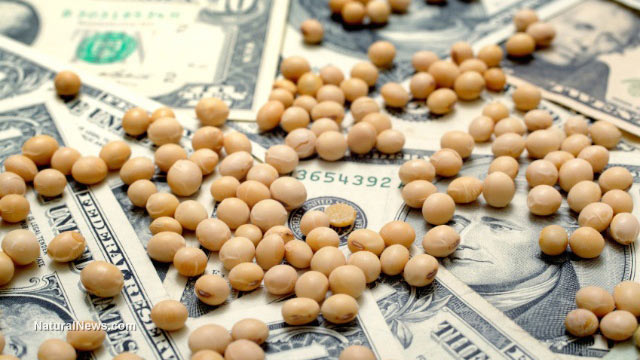GM soy farming displaces indigenous people, raising rates of disease and poverty as corporations profit
Friday, December 12, 2014 by: Daniel Barker
Tags: GM soy, indigenous people, poverty

- Newly released JFK files reveal Pentagon's role in creating Lyme disease and covid in the same lab
- Oncologist warns of ‘terrifyingly aggressive’ cancers in children, linked to immune suppression from COVID vaccines
- Trump administration CUTS FUNDING to Gavi, the Vaccine Alliance - a major blow to the Bill Gates-backed entity
- NIH study, buried for decades, reveals that Flu Shots INCREASE elderly deaths, not prevent them
- Health Ranger Report: Ashton Forbes discusses TELEPORTATION ORBS and their role in MH370 disappearance
- Musk targets “strangely wealthy” lawmakers in DOGE probe, names Pelosi, McConnell, Schumer
- COVID-19 scandal linked to CANCER SURGE: Billionaire researcher sounds alarm
- Millionaire fitness coach charged in Tesla vandalism incident as anti-Musk attacks escalate
- “Ethically sourced” human “bodyoids” could usher in a new era of medical exploitation, raising disturbing ethical questions
- EPA banned chemical linked to cancer, Parkinson's and fatal heart defects in babies - now industry is lobbying to get it reinstated
- Woman contracts WORLD'S DEADLIEST VIRUS after unknowingly being given the WRONG VACCINE
- At least 75 percent of Americans are unknowingly MEDICATED FOR STUPIDITY by fluoridated water – Utah now banning it
- DARPA: The shadowy innovator behind the world’s most advanced military technologies
- Civil war is here – Multiple events, from conservatives being “swatted,” to attacks against Telsa owners, happening across America as Dem politicians are telling supporters to ‘fight in the streets”
- Tackling the rubber waste crisis: Groundbreaking study reveals eco-friendly method to recycle tires
- Ancient kitchen secrets REVEALED: How garlic, ginger and green onions fight cancer and heart disease
- RFK Jr. is pushing Big Pharma ad ban - and corporate media is panicking
- U.K. unveils controversial pandemic preparedness tool: A double-edged sword?
- Newly released JFK files reveal Pentagon's role in creating Lyme disease and covid in the same lab
- Analysis: The coming economic collapse, a mass uprising and Trump's three secret weapons to halt the growing revolt
- Trump's greatest betrayal so far: Accelerating Middle East wars, silencing dissent, and serving Zionist masters
- CDC finally halts $11 billion COVID funding scam as health officials admit the ‘pandemic’ was a fraud
- The hidden dangers in your kitchen: How cooking methods impact diabetes, cancer and aging
- Kiss Your Genetic Privacy Good-Bye! 23andMe Gets Green Light to Sell Your Intimate Genetic Details to Anyone They Want
- DEADLY DECEPTION: How COVID vaccines increased mortality rates and why authorities hid the truth
- Dr. Suzanne Humphries makes bombshell appearance on Joe Rogan podcast, exposing vaccine industry deception back to POLIOMYELITIS
- Trump nominates VACCINE ZEALOT Susan Monarez to lead the CDC, sidelining RFK Jr.'s reform efforts
- Here are TEN all-natural ways to protect your garden without using harmful chemicals
- Woman contracts WORLD'S DEADLIEST VIRUS after unknowingly being given the WRONG VACCINE
- Senate Democrats deny censorship industrial complex existed, defend government's role in silencing dissent
- Black cumin seed oil emerges as a powerful ally against breast cancer and chronic inflammation
- Sugar-free deception: Artificial sweeteners hijack hunger signals, fuel obesity epidemic, study warns
- “Independent” anti-Russia outlet MEDUZA faces COLLAPSE as US funding dries up
- The Health Ranger releases “Vaccine Zombie” song and music video, using AI-animated zombies for the music video
- Discovery of vast underground city beneath Giza pyramids challenges human history
- Key nodes of Federal Government censorship
- Newly released JFK files reveal Pentagon's role in creating Lyme disease and covid in the same lab
- California's social media censorship law struck down: A victory for free speech or a threat to online safety?
- EPA advisor admits the agency is funneling billions to climate groups ahead of Trump’s return to White House
- The Health Ranger releases “Vaccine Zombie” song and music video, using AI-animated zombies for the music video
- Dr. Mike Yeadon releases 15-minute testimony - WATCH - about genocidal intent of COVID “vaccines”
- Florida takes a stand: DeSantis proposes permanent ban on mRNA vaccine mandates
- “Why we influenced the 2020 elections”: Facebook files reveal the coordinated effort to bury the Hunter Biden laptop story
- Mike Adams releases country western hit single: Goin’ Back in Time is Comin’ Home
- The pandemic as a tool for INDOCTRINATION: Understanding “The Indoctrinated Brain” by Dr. Michael Nehls
- Unpacking the Lies That We’ve Been Fed – new song and music video released by Mike Adams, the Health Ranger
- Mike Adams releases music poetry sensation: A Child of God
- House Intelligence Committee calls for the ARREST and PROSECUTION of Dr. Anthony Fauci
- Rep. Nancy Mace introduces bill to ban biological males from female facilities on federal property
- Michigan sheriff announces criminal investigation into 2020 election crimes, Dominion Voting Systems
- Peter Rost exposes Big Pharma corruption in his book “The Whistleblower: Confessions of a Healthcare Hitman”
- Migrants are taking advantage of recent hurricanes to scam residents and loot their homes
- Sugarcane extract superior to cholesterol-lowering drugs?
- Survival 101: Effective EMF blocking techniques
- Red Cross issues warning to stop blood plasma donations from vaccinated people
- Scientists confirm: GENIUS brain function can be spontaneously unleashed in humans without any apparent cause
- EPA advisor admits the agency is funneling billions to climate groups ahead of Trump’s return to White House
- HYSSOP: What research reveals about the health benefits of this ancient holy herb
- Two containers with completed ballots fall out of truck in Florida
- Fully vaccinated about to see “tsunami” of illness and death, warns virologist
- Global leaders unite to clamp down on “misinformation” with UN-backed Cascais Declaration
- BREAKING: 2025 NDAA authorizes mandatory military draft of WOMEN across America… as Pentagon pursues global NUCLEAR war with both Russia and China at the same time
- Michael Yon warns of a ZIONIST TAKEOVER in Trump’s second administration
- BOMBSHELL: DNA testing kits are a SCAM to develop ethnic-specific bioweapons
- Ozempic and Wegovy weight loss drugs are injectable LIZARD VENOM PEPTIDES that may unleash a devastating wave of organ failure… side effects align with symptoms of SNAKE BITES
- Israeli soldiers accused of even more torture and abuse in the West Bank
- These 13 countries just signed an agreement to engineer a global FAMINE by destroying food supply
- NASA admits that climate change occurs because of changes in Earth’s solar orbit, and NOT because of SUVs and fossil fuels
- RFK Jr. clears key hurdle: Sen. Susan Collins backs controversial HHS nominee, signaling a new era for health policy
- Sermon 30: How Jesus reveals Caesar’s FAKE CURRENCY and FALSE AUTHORITY
- Coriander seeds: Ancient medicine backed by modern science
- Arizona officials claim Maricopa County needs 10-13 days to tabulate results of the election
One sad example is the plight of indigenous people living in Paraguay, who are being displaced and sickened by GM soy farming projects. The indigenous people of Paraguay account for only 2 percent of the country's total population, but in recent times they have become the victims of land-grabbing schemes and illegal logging in the forests where they have lived for centuries.
Now they are being further threatened by the GM soy-exporting corporations who have cut down huge swaths of forest and poisoned the environment in which they struggle to continue living according to their old traditions.
Paraguay's indigenous people suffer a poverty rate of 63 percent, a rate which is many times higher than the national average. Forty percent of indigenous communities in the country no longer have access to land. Meanwhile, those who do have land rights are being systematically overrun by ranching and soy-farming operations, which are forcing many to move to urban areas where their poverty situation becomes even worse.
Those who choose to remain in their traditional communities are being sickened by the pollution resulting from the large-scale GM soy-farming operations, while also having to deal with the consequences of climate change, such as cycles of serious floods and droughts.
UN special rapporteur for the rights of indigenous peoples, Victoria Tauli Corpuz, recently visited Paraguay to investigate. She told reporters in the capital, Asuncion, that Paraguay's recent economic boom has come at the expense of the country's natural resources, such as forests and rivers, on which indigenous communities depend for survival.
According to Tauli Corpuz:
Almost half of the indigenous communities informed me that they lacked land and even when they have property titles, the security of owning land is not guaranteed.
Unequal land distribution has been a serious problem in Paraguay since the 19th century, and things got even worse in the last half of the 20th century, particularly under the dictatorship of General Alfredo Stroessner. Much of the country's state-owned land was given to friends and allies of Stroessner, and there are land reform disputes over those areas continuing today.
When industrialized agriculture and soy farming became widespread in Paraguay during the 1970s, many small farmers were pushed off of their land.
In 1996, the Monsanto corporation began planting genetically modified soy seed in Argentina, which shares a border with Paraguay. Soon after, GM soy farming also began in Paraguay, and the country has now become the fourth largest exporter of soy in the world.
Although the GM soy farming operations in Paraguay generate huge profits for Monsanto and other large corporations, very little of that money is distributed within the country, since these companies are exempted from paying taxes.
Meanwhile, the indigenous people of Paraguay continue to suffer and are almost helpless to do anything other than stand by while their lands and traditional way of life are destroyed by greedy corporations and the corrupt politicians who serve them.
As a report by TeleSURtv.net observed:
Paraguayan farmers and indigenous communities are not only suffering from one of the most unequal distributions of land, but also from the invasion of one of the worst agricultural models: soy exportation, mechanized agriculture, and genetically modified seeds all combined together.
And this is a tragedy that is not limited to Paraguay or South America, for that matter. Similar problems are occurring in Africa and elsewhere -- and even in the United States.
Sources:
http://www.telesurtv.net
http://www.un.org
http://science.naturalnews.com
GM soy at FETCH.news
Get independent news alerts on natural cures, food lab tests, cannabis medicine, science, robotics, drones, privacy and more.
Take Action: Support Natural News by linking to this article from your website
Permalink to this article:
Embed article link: (copy HTML code below):
Reprinting this article:
Non-commercial use OK, cite NaturalNews.com with clickable link.
Follow Natural News on Facebook, Twitter, Google Plus, and Pinterest
Science News & Studies
Medicine News and Information
Food News & Studies
Health News & Studies
Herbs News & Information
Pollution News & Studies
Cancer News & Studies
Climate News & Studies
Survival News & Information
Gear News & Information
News covering technology, stocks, hackers, and more



"Big Tech and mainstream media are constantly trying to silence the independent voices that dare to bring you the truth about toxic food ingredients, dangerous medications and the failed, fraudulent science of the profit-driven medical establishment.
Email is one of the best ways to make sure you stay informed, without the censorship of the tech giants (Google, Apple, Facebook, Twitter, YouTube, etc.). Stay informed and you'll even likely learn information that may help save your own life."
–The Health Ranger, Mike Adams













































